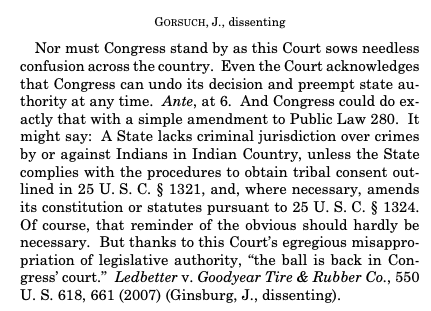Against hundreds of years of congressional action, against solid #SCOTUS precedent, and hundreds of years of history, the Supreme Court held today that states have jurisdiction over certain crimes in Indian Country by judicial fiat. A devastating result for our democracy. 

There is little to say here other than the fact that our Supreme Court has become a superlegislature. Precedent, statutes, separation of powers, reason, the rule of law, these things all mean nothing.
So what can we do? Unlike #Dobbs, Congress can undo #SCOTUS without any constitutional difficulty. We can send the Supreme Court a message TODAY that its decision to take over all branches of our government will not succeed. With a single statute, Congress can "fix" this result.
Please take all of this rightful and righteous anger at #SCOTUS and check their power today. Call on Congress to pass a Castro-Huerta "fix." It takes one statute. Please. The message we could send to #SCOTUS checking their power is vitally important to us all.
Hello again, friends, rather than arguing over what to call us, could you please just call your member of Congress? Ask for a “Castro-Huerta fix” to check the power of this runaway Supreme Court. (We can clarify other language later.)
• • •
Missing some Tweet in this thread? You can try to
force a refresh










